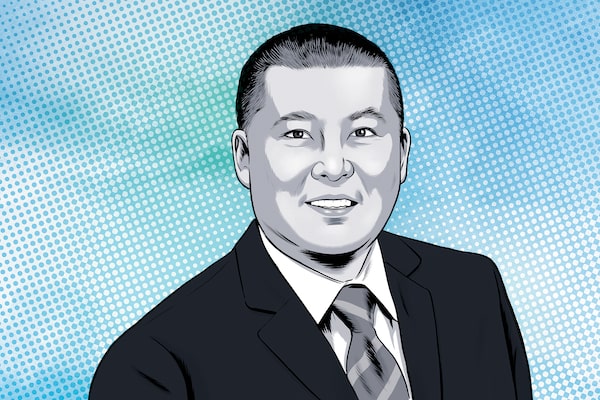
Stan Wong of Scotia Wealth Management.Joel Kimmel/The Globe and Mail
Sign up for the Globe Advisor weekly newsletter for professional financial advisors on our sign-up page. Get exclusive investment industry news and insights, the week’s top headlines, and what you and your clients need to know. For more from Globe Advisor, visit our homepage.
When it comes to forecasts of a recession, money manager Stan Wong likes to monitor the markets for clues.
“The stock market leads the economy; the economy doesn’t lead the stock market,” says Mr. Wong, a portfolio manager and senior wealth advisor with The Stan Wong Group at Scotia Wealth Management in Toronto, who oversees about $500-million in assets.
He notes that markets dropped last year in anticipation of an economic slowdown, and the economy did pull back, but markets have risen steadily since October.
“The stock market is saying, ‘We’re not going to have a deep recession,’ which is what 2022 priced in. I think we’ll see a rolling recession through certain sectors, but many of the signals are now pointed to a soft landing more so than an outright recession.”
Mr. Wong has been an active investor as the markets shifted, shifting away from energy – a major weighting in 2022 – and toward certain technology and consumer stocks he believes will do well in the coming months.
His all-equity portfolio – which currently includes 51 per cent U.S. stocks, 27 per cent Canadian, 17 per cent international and 5 per cent cash – is up 13.5 per cent for the past year as of June. 30. Over the past decade, his all-equity portfolio has seen an average annual compound return of 15.4 per cent as of June 30. The performance is based on total returns and net of fees.
The Globe spoke to Mr. Wong about his investment approach and what he’s been buying and selling:
Describe your investment approach:
My investment approach is based on macroeconomic analysis, quantitative analysis – I screen companies based on certain criteria – and technical analysis, which I use to understand market exit and entry points. This approach enables me to construct portfolios that capture evolving opportunities and mitigate potential risks. My portfolios also tend to be more actively managed. I believe a more tactical approach will outperform a more passive approach, especially with how things are rotating and changing in the market. An example is when technology was down last year, but the energy sector was up. This year, it’s almost the opposite. I also like companies with strong industry leadership positions in which competition is limited.
What’s your take on the current market?
Markets have been remarkably resilient. We’ve had the challenges of a U.S. banking crisis in the spring, rising interest rates and lingering recession worries, yet the S&P 500 is up about 30 per cent from its lows last October. Most of the returns were driven by a small handful of mega-cap technology and communication stocks, but recent market breadth has expanded to include other stocks and sectors. That breadth will continue to broaden partly due to easing inflation, allowing central banks to pause interest rate hikes, and we may see lower rates in 2024. If we look back in history, a more stable interest rate environment has benefited equities and bonds. Also, U.S. consumer spending remains fairly robust, and the employment backdrop remains pretty healthy.
What have you been buying or adding?
One name I’ve owned for several months, and have been adding to, is ASML Holding NV ASML-Q, a Netherlands-based semiconductor manufacturing equipment company. It’s a global leader in cutting-edge semiconductor manufacturing equipment. It has a near monopoly in fabricating extreme ultraviolet lithography technology needed to make advanced processor chips. It provides manufacturing equipment to semiconductor companies, including Intel Corp., Samsung Electronics Co. Ltd., and Taiwan Semiconductor Manufacturing Co. Ltd. ASML should also benefit from the rise in artificial intelligence, 5G and cloud computing, as these technologies drive increased demand for chips.
Another stock we have owned for the past year and continue to buy is LVMH Moet Hennessy Louis Vuitton SE LVMUY, the global retailer behind luxury brands such as Louis Vuitton, Christian Dior, and Givenchy. Luxury goods are in demand during almost any economic condition, allowing LVMH to maintain strong pricing power. Demand is growing, particularly in Asia, and very few companies have LVMH’s scale.
Visa Inc. V-N is a company we’ve owned for several years and have been adding to recently. It’s a leader in digital payments and continues to benefit from post-pandemic spending. Longer-term, there’s a clear secular trend away from cash to electronic payments, so the company has a lot of growth runway.
What have you been selling or trimming?
I’ve been trimming my energy position. I had more than 25 per cent of my equity portfolios in energy last year and did quite well. The U.S. energy sector was up 65 per cent in 2022, for example. I don’t dislike energy, but I just wanted to take some profits. I sold two stocks to reduce my energy weighting: Chevron Corp. CVX-N and Phillips 66 Co. PSX-N. We continue to hold names like Exxon Mobil Corp. XOM-N, Shell PLC SHEL-N and Canadian Natural Resources Ltd. CNQ-T.
What advice do you have for new investors?
It’s the same advice I have for more experienced investors: Avoid investing with emotion and always take a more rational approach. After doing this for more than 25 years, I’ve seen greed and fear take over far too many times, from the euphoria of the dot-com bubble in the late 1990s or, more recently, the hype around cannabis or meme stocks. Instead, investors should maintain a more rational or logical mindset and focus on sound fundamentals.
This interview has been edited and condensed.